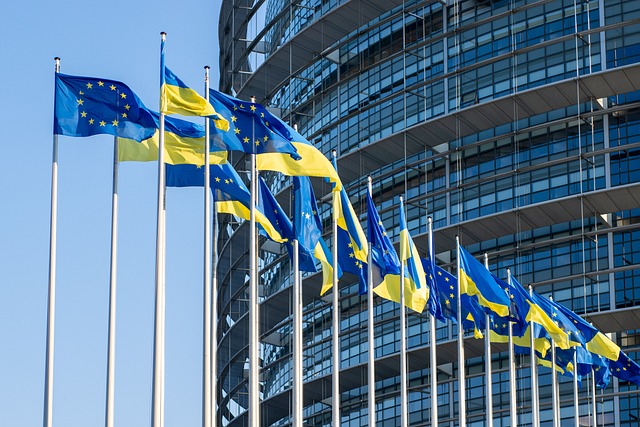One step forward, two steps back? – Or a brief assessment of the status of Ukraine and Moldova as EU membership candidates
 This blog post tries to demonstrate why the European Union (henceforth abbreviated as the EU or the Union) considers enlargement policy as a key domain these days – whether it considers it as a foreign policy or geopolitical instrument, and how this relates to Ukraine and Moldova’s candidate status. Read more… (Petra Olesnyovics)
This blog post tries to demonstrate why the European Union (henceforth abbreviated as the EU or the Union) considers enlargement policy as a key domain these days – whether it considers it as a foreign policy or geopolitical instrument, and how this relates to Ukraine and Moldova’s candidate status. Read more… (Petra Olesnyovics)


 Nowadays the people can easily fulfil their wishes via various online platforms, websites just in a few seconds. But the more the technology progresses the more questions will arise whether we are able to purchase services safely or we are the victims of shady manipulation tactics which are intended to influence us and which the average consumer hasn’t got much chance to recognize on his own. Algorithms provide personalised services, and, in this context, comfort functions tailored to consumer needs. Moreover, data-driven technologies enable businesses to micro-target consumers with advertising and personalised offers, monitor competitors’ prices more easily and this comfort may give the people false sense of safety. In this essay I will talk about the importance of recognizing the dark patterns and how they are being used in the practice.
Nowadays the people can easily fulfil their wishes via various online platforms, websites just in a few seconds. But the more the technology progresses the more questions will arise whether we are able to purchase services safely or we are the victims of shady manipulation tactics which are intended to influence us and which the average consumer hasn’t got much chance to recognize on his own. Algorithms provide personalised services, and, in this context, comfort functions tailored to consumer needs. Moreover, data-driven technologies enable businesses to micro-target consumers with advertising and personalised offers, monitor competitors’ prices more easily and this comfort may give the people false sense of safety. In this essay I will talk about the importance of recognizing the dark patterns and how they are being used in the practice. 
 When we talk about the enforcement of our labor claims, we immediately may think about the classic ways provided in our Labor Code, such as the mutual agreement of the parties, demand for payment, or the most important way: the labor lawsuit. This short article undertakes to examine and present the question of how the ways of termination collaborate with the interest of both parties of the employment relationship, and to find its possible critical points.
When we talk about the enforcement of our labor claims, we immediately may think about the classic ways provided in our Labor Code, such as the mutual agreement of the parties, demand for payment, or the most important way: the labor lawsuit. This short article undertakes to examine and present the question of how the ways of termination collaborate with the interest of both parties of the employment relationship, and to find its possible critical points. 
 According to the rules, the approval of a project is only possible when the implementation does not adversely affect the quality of the drinking water provided to the inhabitants in the affected area. The Regional Office for Mining, Geology and Raw Materials, Cottbus (Germany) approved an application submitted by Lausitz Energie Bergbau AG for the construction of an artificial lake, the overflow of which would flow into the river Spree. Upon creation of the lake, the water leaving the overflow would have a significantly higher sulphate concentration than the water already in the Spree.
According to the rules, the approval of a project is only possible when the implementation does not adversely affect the quality of the drinking water provided to the inhabitants in the affected area. The Regional Office for Mining, Geology and Raw Materials, Cottbus (Germany) approved an application submitted by Lausitz Energie Bergbau AG for the construction of an artificial lake, the overflow of which would flow into the river Spree. Upon creation of the lake, the water leaving the overflow would have a significantly higher sulphate concentration than the water already in the Spree. 
 Hungary is the first country in the region and the EU to have recently introduced official price regulation. But Hungary is not the only European country where the government intervenes in market prices. It has been applied in Croatia, Slovenia and Serbia, and Poland has taken a different approach to the problem of price volatility. Despite the fact that, according to economists, price regulation may be justified for a short period of time, it has been used in our country for a long time. Furthermore, in the October 2022 decision, the Hungarian government extended it to additional basic foodstuffs. However, with this decision, the government does not help to reduce inflation, it only covers it up.
Hungary is the first country in the region and the EU to have recently introduced official price regulation. But Hungary is not the only European country where the government intervenes in market prices. It has been applied in Croatia, Slovenia and Serbia, and Poland has taken a different approach to the problem of price volatility. Despite the fact that, according to economists, price regulation may be justified for a short period of time, it has been used in our country for a long time. Furthermore, in the October 2022 decision, the Hungarian government extended it to additional basic foodstuffs. However, with this decision, the government does not help to reduce inflation, it only covers it up. 
 Offshore companies play an exceptionally important role in the macroeconomy. As a result of the recently emerging scandals (Panama papers, Pandora papers) now they could face more attention than ever before. Despite the commonly regarded negative sense of macroeconomy, it is undeniable that it has many positive effects, especially in terms of tax optimisation, or encouraging investment. It is important to note, that offshore companies raise several questions and concepts, which require further elaboration: such as their legal regulation, the term of tax avoidance, and the blacklist (the list of non-cooperative EU countries from a tax point of view).
Offshore companies play an exceptionally important role in the macroeconomy. As a result of the recently emerging scandals (Panama papers, Pandora papers) now they could face more attention than ever before. Despite the commonly regarded negative sense of macroeconomy, it is undeniable that it has many positive effects, especially in terms of tax optimisation, or encouraging investment. It is important to note, that offshore companies raise several questions and concepts, which require further elaboration: such as their legal regulation, the term of tax avoidance, and the blacklist (the list of non-cooperative EU countries from a tax point of view). 
 The COVID-19 pandemic has also opened a new chapter concerning cases of domestic violence – social and economic tensions, isolation, the difficulty in accessing external support, and the increase in alcohol consumption seemed to fill the gaps in the walls that had widened due to years of struggle. To illustrate, an increase of up to 25% was observed in countries with signalling systems, while in Brazil, the number of domestic violence cases increased by 40–50%; in Cyprus and Spain, the helplines received 20–30% more calls in the first days of the quarantine, furthermore, in the UK, within a week after strict social distancing and lockdown measures were introduced, the authorities received 25% extra calls related to domestic violence.
The COVID-19 pandemic has also opened a new chapter concerning cases of domestic violence – social and economic tensions, isolation, the difficulty in accessing external support, and the increase in alcohol consumption seemed to fill the gaps in the walls that had widened due to years of struggle. To illustrate, an increase of up to 25% was observed in countries with signalling systems, while in Brazil, the number of domestic violence cases increased by 40–50%; in Cyprus and Spain, the helplines received 20–30% more calls in the first days of the quarantine, furthermore, in the UK, within a week after strict social distancing and lockdown measures were introduced, the authorities received 25% extra calls related to domestic violence. 
 Three regulations are relevant in the procedure of the Hungarian Permanent Court of Sport (hereinafter: HPCS). Act LX of 2017 on Arbitration (hereinafter: Vbt.), Act I of 2004 on Sports (hereinafter: Stv.), and the procedural regulations of the Hungarian Permanent Court of Sport, which explain the provisions of the Stv. It is clear that the concrete, sport-specific rules of procedure are found in the HPCS regulations. The detailed rules are found in the internal procedural rules of all Hungarian arbitration courts. They are easier to change than laws.
Three regulations are relevant in the procedure of the Hungarian Permanent Court of Sport (hereinafter: HPCS). Act LX of 2017 on Arbitration (hereinafter: Vbt.), Act I of 2004 on Sports (hereinafter: Stv.), and the procedural regulations of the Hungarian Permanent Court of Sport, which explain the provisions of the Stv. It is clear that the concrete, sport-specific rules of procedure are found in the HPCS regulations. The detailed rules are found in the internal procedural rules of all Hungarian arbitration courts. They are easier to change than laws. 
 The European Union has been linked to the energy sector from the beginning. However, it is worth noting that this area is still a shared competence in the integration. The European Union has many challenges in the field of energy policy, such as increasing import dependence, limited diversification, increased energy demand, climate change, the lack of renewable energy sources, and shortcomings in the integration of energy markets. Among these, energy dependence is largely determined by the evolution of energy consumption. Therefore, it is important to examine the relationship between energy production and consumption between 2010 and 2020 in the European Union.
The European Union has been linked to the energy sector from the beginning. However, it is worth noting that this area is still a shared competence in the integration. The European Union has many challenges in the field of energy policy, such as increasing import dependence, limited diversification, increased energy demand, climate change, the lack of renewable energy sources, and shortcomings in the integration of energy markets. Among these, energy dependence is largely determined by the evolution of energy consumption. Therefore, it is important to examine the relationship between energy production and consumption between 2010 and 2020 in the European Union. 
 The characteristics of people’s daily transport routines are different, as they differ according to the size of the settlement, various social and demographic characteristics, different travel destinations and even the season and time of day. In our empirical survey, we chose to examine one of the most significant influencing factors, namely the gender aspect in Debrecen and its immediate vicinity. According to a 2019 OECD report, the needs of men and women in public transport are different. The latter prefer to use public transport more than the opposite sex, yet their needs are taken into account less when making transport decisions.
The characteristics of people’s daily transport routines are different, as they differ according to the size of the settlement, various social and demographic characteristics, different travel destinations and even the season and time of day. In our empirical survey, we chose to examine one of the most significant influencing factors, namely the gender aspect in Debrecen and its immediate vicinity. According to a 2019 OECD report, the needs of men and women in public transport are different. The latter prefer to use public transport more than the opposite sex, yet their needs are taken into account less when making transport decisions.